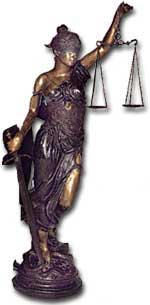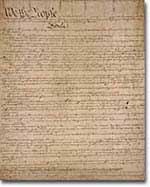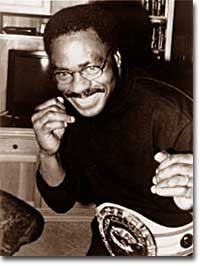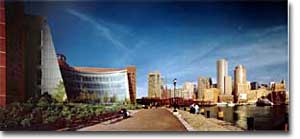
9. The Judicial Branch

Lady Justice's blindfold, sword, and scale are reminders that justice should be administered in an impartial, firm, and balanced manner.
"See you in court!"
"You can't do that. I know my rights!"
"I'm going to take this all the way to the Supreme Court!"
These cliché sentences reflect a core American belief: citizens of the United States can seek redress through the judicial system.
But how do courts protect citizen rights?
How does a case even get to the Supreme Court? How are basic rights preserved? Where do citizens go when freedoms, rights, or equality is threatened? Does justice prevail?
Throughout history, the American people have gone to the courts, seeking justice. The court system, then, is a cornerstone of democracy in the United States.
Justice Is Blind

The Constitution of the United States establishes the judicial branch and defines many of the rights the judiciary protects.
Congress passes laws, and the president and the executive branch make recommendations and set policy. According to American ideals, judges often make impartial and wise decisions that elected officials find difficult to make.
Members of Congress, state governors, and the president must always worry about elections and popular opinion. As a result, they may lose sight of the need to preserve American values, and they sometimes set hasty or unjust policies.
Under the guidance of constitutional principles, the courts serve as watchdogs for the other branches of government. Without the justice system, democracy might easily veer off course.
Is Justice Blind?

Does the American justice system always work? In 1966, Rubin "Hurricane" Carter was convicted of a triple murder he did not commit. He spent almost 20 years in prison, losing his family ties and a promising career in boxing.
But in reality, does the American justice system uphold these ideals? There are plenty of stories about innocent people held in prison and even prisoners executed for crimes they did not commit. Judicial critics abound. Some protest that the wealthy or the well-connected receive preferential treatment in courts.
Other critics of the judicial system cite statistics they believe to be evidence of racial and social discrimination. For example, a disproportionate number of prisoners are young, African American, and male.
Legal defense lawyers for the poor are sometimes criticized for being incompetent or apathetic. Cases in both federal and state courts are often backed up for years, making a mockery of "the right to a speedy public trial" as guaranteed by Amendment VI of the Bill of Rights.
Congress and the president are often at loggerheads over appointments of federal judges. Because the Republicans don't like a Democratic president's nominees (and vice versa), judgeships stay vacant for months, sometimes years.
Judge for Yourself

This federal courthouse in Boston, Massachusetts, won a Federal Design Achievement Award in 2000 for expressing the solemn, dignified, and open nature of the United States judicial branch.
Yet despite all these criticisms, courts remain powerful protectors of freedoms.
Freedom of speech has been protected, whether the speaker has been a critic of unjust government policy or a burner of the American flag.
Segregation of public facilities ended partly because brave people took their cases to court. Freedom of religion interpretations have banned involuntary school prayer, preserving the separation of church and state, while stirring up criticisms that the Judeo-Christian heritage on which the nation was founded is slowly being eroded.
Although the wheels of justice often grind slowly, judges' decisions are usually the final word in interpreting basic constitutional principles. Almost from its beginning, the American judicial system has played a major role in defining and preserving freedom, equality, and justice.
Don't believe it? Read on and judge for yourself.






